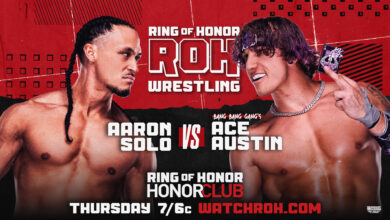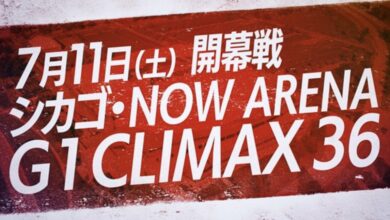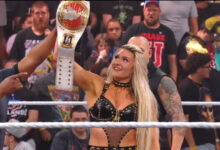Eric Bischoff On The nWo’s Influence On The Attitude Era And If Bad Casting Was To Blame For Its Downfall
Eric Bischoff was a recent guest on The Two Man Power Trip Of Wrestling and spoke at length about his time as the head of WCW during the Monday Night Wars.
Here are some submitted highlights.
Some say the nWo doesn't get enough credit for being what spurred the Attitude Era in WWE.
Does that bother him?:
“Not anymore. It used to bother me a lot more years ago because my ego was still very much involved and my pride and (you know) I’m a human. I have an ego, I have pride and there were times years ago when I’d get irritated when I’d hear people almost forget that the nWo is what kind of launched that anarchy type theme because that is really what it was. I do think that Vince McMahon turning heel (one year after I did by the way) and kind of going from the stuffed suit announcer that nobody really associated as being the owner of the company and then all of a sudden he’s showing up in a black jean jacket and is the evil boss a year after I did it? It used to irritate me but here’s what I’ve learned over the years. There are basically seven basic story-line plots and it goes back hundreds and thousands of years across different civilizations and different cultures before there was any form of communication. The human experience and the human psychology tends to create stories that are very familiar in the human psyche. So again, when you look at the a movie like “Jaws” and you realize that’s the kind of a story that was told thousands of years ago and you can Google just about any current film and you can find the roots of that story in something that was hot 15-20 years ago.”
On Sean Waltman’s role in both WCW and WWE during that time:
“One of the reasons in my opinion (and it’s just my opinion) that DX in the Attitude Era was as successful as it was, was because of Sean Waltman. Because Sean Waltman gave it credibility. Sean Waltman just like Scott Hall and Kevin Nash did as the two guys that came over and turned WCW upside down, Sean Waltman was a guy that left the nWo and went over to WWE and they came back and turned WCW upside down. So I think Sean Waltman probably deserves a lot more credit in the overall success of the Attitude Era and the nWo than people really give him credit for.”
Did ECW have any influence on the way he programmed WCW?:
“I never watched ECW. First of all it was only available on a limited kind of scale and it just wasn’t my cup of tea anyway. Paul Heyman did a lot of amazing things. I’m friends with a lot of guys that were right there at the epicenter of it. Bubba Dudley is a good friend of mine and we stay in touch and we’ve talked a lot about it over the years. We’ve worked together, we’ve worked in creative together, we’ve worked in the ring together, we’ve sat in a room with dozens of people and listened to them babble about what they thought they knew about storytelling and wrestling (we’d both just look at each other and roll our eyes) but Bubba will be the first one to tell me how innovative Paul Heyman was and I recognize that. But there was a difference between the Paul Heyman style of innovation and some of the crazy stuff that Paul did which was really out of the box in terms of a way to present wrestling at that time. Paul innovated a lot of crazy stuff. But there was nothing that Paul did that was anywhere in my opinion remotely close to again the storytelling perspective and the arc of the nWo…nothing.”
Did he borrow the nWo angle from an older one in New Japan?:
“It wasn’t a New Japan story line. I’ve gone into this conversation a lot and I never really seem to do a very good job of articulating it but there was a period of time before the nWo in 94/ 95 in particular when I was spending a lot of time in Japan. This is where all of the internet wrestling community needs to get out a pencil and a paper and take some very detailed notes here. I was going to Japan on a regular basis and I studied while I was there. I was trying really hard to study how other successful people presented wrestling and to try and figure out a solution to the WCW challenges at that point in time. I was studying the psychology of the storytelling that was presented in Japan because at that time wrestling was treated like a sport. It had a lot of credibility and the big Tokyo Dome shows on a Saturday night would be the big headlines in the Sunday morning sports pages. I spent so much time learning about the psychology in Japanese storytelling and how they did a phenomenal job of convincing the audience that what they were seeing was real. It allowed the audience to forget that it was professional wrestling. It wasn’t like that in Japan back then it was very believable and very credible. I kept discovering that in the analysis of the psychology of the storytelling process was that the takeover idea; It’s war, it’s one country taking over a another county. It’s one gang wanting to take over another gang’s neighborhood. That’s when the light bulbs went off. The formation of that storytelling kind of approach had really been brewing inside of my skull for about a year and when it was done more than anything it was like the perfect storm of storytelling and the psychology that I was trying to formulate in Japan that crossed paths uniquely with the availability of Scott Hall and Kevin Nash.”
Does he believe that certain members of the nWo were cast incorrectly?:
“Reflecting back at it now I think it is fair to say that we got away with a lot of mistakes, clearly. Look at early on because momentum was so huge that I would disagree and with all due respect to Ted Dibiase who I respect immensely as a performer and a guy who has a legacy in the industry but to me he was a failed experiment with the nWo. Not because of him, it was because of me. It was bad casting. To take a guy like Ted Dibiase at that stage of his career and throw an nWo shirt on him was just bad casting. It is not that he was a bad actor or that it was a bad story that he was being cast in it was just as a character he was a square peg in a round story hole and it didn’t quite fit. With Virgil it was the crossover and anytime that somebody was recognized and it was the momentum that it looked like anyone that was anybody was coming into the nWo and into WCW because we were the hottest party to be at. So every time someone did you got a great reaction. But sometimes that great reaction only lasted a couple of weeks and it started to dilute the story.”
______________
You can download the full podcast at this link, or on iTunes.




